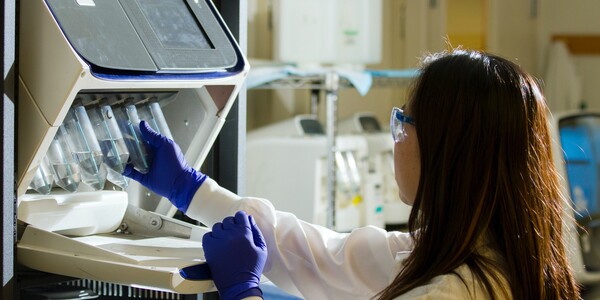
Main Second Level Navigation
Breadcrumbs
- Home
- Future Students
- Graduate Education
- Explore our Graduate Programs
- Course-Based Masters
- Applied Immunology
Applied Immunology
MSc
Our Program
The MSc in Applied Immunology is a two year, research-based, non-thesis degree program housed within the Department of Immunology.
Through course work and a major research project in a host laboratory, we train students to design, implement, and evaluate immunological research that measures immune responses and/or immune function.
Instead of a thesis, students complete oral and written presentations throughout the program to summarize their findings and discoveries. Students can personalize their learning from a wide array of graduate courses to fulfill their electives, available within and outside of our department.
Students can also, if they choose, complete a four-month internship or an international research opportunity. Students receive a guaranteed stipend (equivalent to tuition + incidental fees).
Courses

Students in this program complete 7.0 FCE
Year One
- IMM1450Y – Major Research Project I, 1.0 FCE
- IMM1550Y – Major Research Project II, 1.0 FCE
- IMM1436H – Techniques in Immunology, 0.5 FCE
- 1.0 FCE from the following courses: IMM1428H (Molecular Immunology, 0.5 FCE), IMM1429H (Developmental Immunology, 0.5 FCE), IMM1430H (Clinical Immunology, 0.5 FCE), IMM1431H (Immunotherapy, 0.5 FCE)
Year Two
- IMM1050H – Easton Seminar Series, 0.5 FCE
- IMM1075H – Special Topics in Immunology 0.5 FCE
- IMM1650Y – Major Research Project III, 1.0 FCE
- IMM1651H – Applied Research in Immunology, 0.5 FCE
- 1.0 FCE electives
*Successful students typically complete this program within 2 years. Students from U of T who completed a specific set of pre-requisites can enter the program with advanced standing and complete their degree requirements in 16 months.
Alumni Profile

Kennedy Hoven, MSc
During my MSc., I investigated the effects of protein manipulation on disease progression and learned cutting-edge scientific techniques, such as stereotaxic surgery and flow cytometry.
The program helped me develop my communications skills through a Communications Certificate and many opportunities to present my work. Student-led career panels introduced me to career prospects outside of academia and provided opportunities to network with professionals.
During my final term, I travelled to the Helmholtz Centre for Infection Research in Germany, where I worked on identifying populations of exTregs in CMV0+ blood donors using flow cytometry and cell sorting. Now that I’ve graduated, I hope to join the biotech or pharmaceutical industry in my home province of British Columbia.
Potential Career Paths
Sample Job Titles
Alumni from our program have successfully transitioned into further education such as PhD programs, medical school, and law school. Others have successfully transitioned into diverse roles such as:
- Consultant
- Research Associate
- Research Technician
- Editor
- Clinical Research Analyst
- Commercialization Analyst
- Senior Associate Scientist
- Medical Writer
By the Numbers
Department of Immunology
*Full course equivalent. A typical 0.5 FCE is over one term (13 weeks), meeting 1-2 times per week. A typical 1.0 FCE is over two terms (26 weeks), meeting 1-2 times per week.